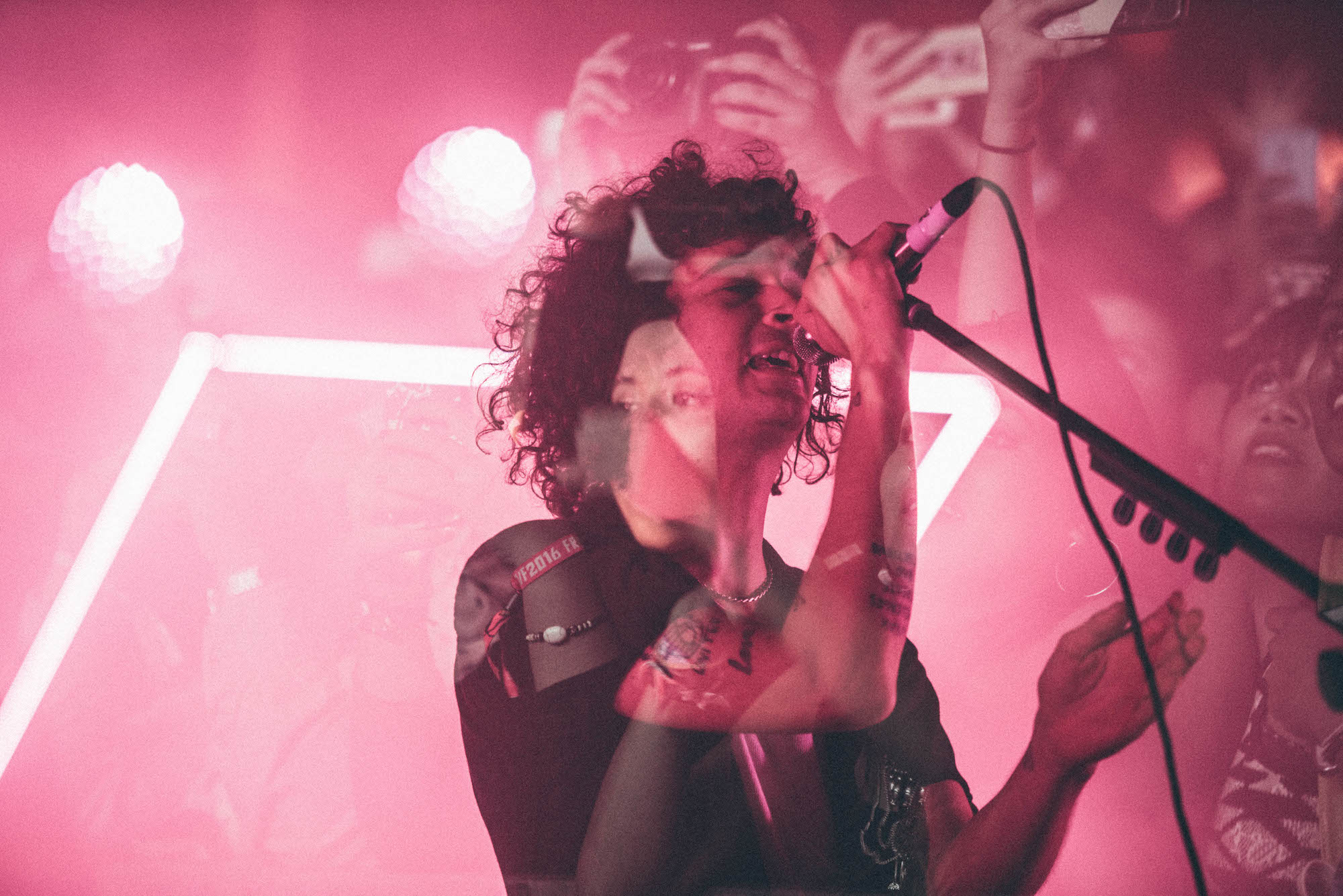The 1975’s Matt Healy Discusses Insecurities, Social Anxiety, and Being A Feminist
 Thirsty for JUICE content? Quench your cravings on our Instagram, TikTok and WhatsApp
Thirsty for JUICE content? Quench your cravings on our Instagram, TikTok and WhatsApp
Celebrities aren’t immediately affiliated with having to endure mental breakdowns as often as the person outside of such a circle would face. Although we do romanticise the idea of an artiste’s perfection to a certain extent, it is also a comforting reminder to know that despite having fame and adoration, they too are capable of being momentarily consumed by anxiety. Take Matthew Healy — or Matty as he’s fondly referred to as — as an example; he materialises his vulnerabilities into songs, which helps create emotional bonds between fans of The 1975 and him due to their relatability. He is looked up to for his songwriting and his endearing eccentricities, both of which seem to have made him more attractive to his audience who sees him as something of a sex god. But beneath his moptop and million pound smile, he too has demons that he has to face, as JUICE found out after speaking to the frontman of The 1975 a couple of hours before their set at Good Vibes Festival ’16, in which we discussed being aware of the world’s current issues, staying creatively hydrated, and if he had always been a sex symbol.
Images Roger Deckker + All Is Amazing
You mentioned in an interview that George didn’t have as much confidence prior to recording I Like It When You Sleep, for You Are So Beautiful yet So Unaware of It, what was happening there?
Everybody’s got personal stuff in their life – we’d been on tour for like two and a half years, so we were kind of exhausted. I think what it was is when we were on tour, we started writing I Like It When You Sleep… and it was kind of something that kept us sane and creatively nourished by the end of our tour. We obviously knew we were going to finish touring, and then there’d be a period of months where we were getting the album ready, then, we’d go and record it, but I think when we got to that time [to record], the transition from being on tour, going back and trying to adjust living normally, and the immediate pressure — that we put on ourselves — to make the record, and when that time actually presented itself, it was quite overwhelming.
Self-pressure is the worst.
Yeah, you go through all the clichés in the second album like, “I don’t know if I’m as good as I was on this,” or “I don’t know if I can do this anymore.” And when you’ve literally not got an album, it doesn’t exist, so when you’re at a low point, you think, “Well, I have nothing.” So, he struggled with that but we slowly kept going – it was difficult and it didn’t feel like the fun that it used to be. But out of that we got tracks like ‘Paris’, ‘I Like It When You Sleep…’, and ‘Loving Someone’. They kind of come from that time when we didn’t know what we were doing, and then it kind of switched when we were in LA; George started to feel better, which started to make everything accelerate and as soon as we were back to normal, it was better than ever.
How did you pick up the momentum?
Being in a different environment and putting pressure on ourselves. We just worked really hard – like everyday, I’d be up at 7.30am working on demos ‘cos what I learnt is that inspiration doesn’t come looking for you.
Ain’t that the truth.
You’re not going to wake up one morning and just be inspired – you have to look through stuff, you have to listen to stuff, you have to try something and then get bored of it, and then eventually something will happen and that will be when it starts.
“You’re not going to wake up
one morning and just be inspired.”
“I have a big ego that’s met with
a very, very fragile sense of self.”
Have you gone through similar obstacles?
Of course. I suppose I have quite a bit of an ego because I am ambitious, but I have a big ego that’s met with a very, very fragile sense of self. So, I don’t have a lot of self-esteem, but then I use that to my benefit – like my fragility is part of who I am, so, I suppose to learn that was difficult.
How did you learn to use it to your advantage?
I just paid attention to the people that were at our shows, to the things they said to me, to the reasons that they come to the shows for, and the reason they’re invested in the band. I suppose that gave me a sense of value that I didn’t have before — not that I never valued myself but I was never the biggest fan of myself and I think that I’ve almost made a career of that now.
Is it strange to you that you’ve been able to capitalise on your insecurities?
It is strange but also my reality. I don’t really have any different reference points. I’m not really scared anymore to be myself – I think that I was learning to really be myself and learning that that was what people ultimately wanted were difficult because you’re taught that that’s not what people want. You’re taught to be a certain way.
Yeah, you’re not encouraged to be your genuine self, like the idea that being vulnerable is the equivalent of being weak. So, on the topic of identity, do you ever Google yourself?
Oh yeah!
So, you know your fan base associates you to being a bona fide sex god, right? What were you like prior to being well-known?
Oh, not like that (laughs). You know what it was? I always say this and people think it’s really trivial but it’s true, but do you remember The O.C.?
Yeah, what about it?
That changed my life.
How so?
So, in England, you do like high school which goes up to Year 11 where you’re 16, then, you come back and do Sixth Form which is the college at school and the only difference is, you don’t have to wear a uniform – you can wear your own clothes but they have to be smart. I left Year 11 kind of popular – but I was popular because I was a stoner, so, I was ‘in’ with all the groups, but I wasn’t particularly sexually desired.
Some are going to find that really hard to believe.
I wasn’t bad with girls but I was just a normal teenager. Over that summer, The O.C. came out and the character that Adam Brody played (Seth Cohen) came into everybody’s view and every girl in my school fell in love with Seth Cohen ‘cos they’d never seen an “emo” boy before, and I turned up at school pretty much in Seth Cohen fancy-dress – ‘cos that was the kind of kid I was, listening to Death Cab, had the shirt, the tie, and the moptop – and that was it, I was ‘indie cool guy’ (laughs). That was when my band kind of changed as well ‘cos we were very indulged and a very “geeky” band beforehand, then, we got a bit more swag to us and a bit more… I don’t know, sex appeal? That was a long time ago though, like 10 years.

“I’ve always been a feminist, non-racist person, but
I suppose I’ve never studied them as issues
because I’ve never needed to – that’s not being
ignorant, that’s being a white Western person from England.”
It’s an easy assumption to make that individuals who look like they have it all together have it easy – in a sense that they don’t have to suffer with as many insecurities or anxieties as the next person. We’re sure you have some personal battles of your own, but seeing as there is a halo effect of you being ‘Matty of The 1975’, dealing with anxieties wouldn’t be the first thing people would think of. Do you have any and how do you deal with it?
I think the fact that my troubles come across in my music, we apply to a demographic that feels like that. I have the same anxieties as everybody – like the same things that everyone worries about; social, sexual, financial, cultural. One of the things I need to be aware of is what’s going on in the world all the time because regardless of whether I accept it or not – or whether people think I should accept it or not – I do have a lot of influence over a lot of people, so, I feel the obligation to understand concepts that are way more prevalent in culture whether it be feminism, racism, and stuff like that. I’ve always been a feminist, non-racist person, but I suppose I’ve never studied them as issues because I’ve never needed to – that’s not being ignorant, that’s being a white Western person from England. I feel a responsibility to be as socially responsible as possible and all of my anxieties are like what your anxieties are like. I don’t walk around like ‘Matty from The 1975’, nor do my friends treat me like that, and the girls that I get with – or the girl that I’m getting with – doesn’t treat me as ‘Matty from The 1975’.
How do you make peace with your flaws?
I put it into music; music is my catharsis. It’s my excuse, it’s my apology – it’s my everything for my behaviour. I realise I can even talk about my behaviour in my music that’s quite… quite distasteful but because I’m speaking of that behaviour with such a distaste for it, it’s almost endearing ‘cos people think, “Oh, I’m like that and he knows that he’s like that.” Being on tour is hard, being a human being is difficult and confusing – drugs are always going to be there, those kinds of things are always going to be there, so I don’t know how I deal with my demons but I do take it a day at a time.
Speaking of touring, how do you and the rest of the band remain as a functional peaceful unit after being on tour for so long?
We’ve never been apart since we were 13. I think that that’s something that must be difficult for a lot of bands – bands that come together when they’re 18 or 19 or bands that are found out of something other than being kids and friendship, because if you’re at that age and you start a band, you think The Strokes look fucking cool, you want to get laid and you want to wear a leather jacket, then it’s “I want to be the songwriter!”, “I want to be the singer!”, and then it’s all fucked up whereas we were kids and instead of playing football, we played music. I don’t know what it’s like to not see them everyday, so it’s actually weird when we’re off tour – that’s when we speak to each other on the phone and we’re like, “Umm, hi…” (laughs) ‘cos it feels unnatural.
What’s the longest duration you’ve been apart from George?
Recently – he just broke his arm, he was out for 10 weeks and there was a period of four weeks that I didn’t see him, that’s the longest I’ve not seen him for in 30 years, and the longest before that was four days. I remember.
That’s really sweet.
It is sweet! But we’re kind of symbiotic, but not only socially, like romantically; our girlfriends have always been friends, and professionally we are the same.
Okay, last question – we’re going back to feelings – what would you say to people who are trying to manage their own anxieties?
Listen to ‘Beautiful’ by Christina Aguilera. You can’t tell somebody not to be anxious the same way you can’t tell somebody to be hungry – if you’re hungry, you’re hungry. It’s not something you can think your way out of, I would just say that you’re not the only person who feels like that but the problem with anxiety and social anxiety is that it makes you feel like you’re the only person in the world [that feels that way].
The 1975 played on Day 1 at Good Vibes Festival on Friday 12 August ’16.


 Get Audio+
Get Audio+ Hot FM
Hot FM Kool 101
Kool 101 Eight FM
Eight FM Fly FM
Fly FM Molek FM
Molek FM